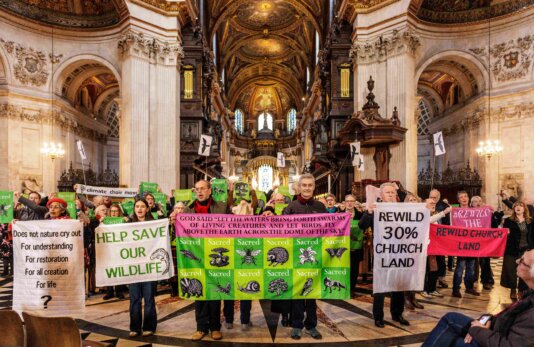- About
- Topics
- Story
- In-Depth
- Picks
- Opinion
- News
- Donate
- Signup for our newsletterOur Editors' Best Picks.Send
Read, Debate: Engage.
| topic: | Conservation |
|---|---|
| tags: | #Rewilding, #biodiversity |
| located: | United Kingdom |
| by: | Joel Scott-Halkes |
Picture Britain as a rather large boat with 68 million passengers onboard. Half of the entire vessel is owned and managed by just a handful of people - the royal family, billionaire investors, aristocrats and ancient institutions like the Church of England or the Oxbridge colleges.
In such an imbalanced nautical arrangement, what would happen if the tiny elite at one end of the boat started drilling holes in their portion of the hull? Surely even the most conservative minded commentator would agree that those of us stuck in the other half would be quite within our rights to demand a say on the matter. After all, we’d all be going down with the ship.
Apply this thought experiment to the land of Britain however, and even progressively-minded parts of our political class seem willing to hand uninhibited rights of sabotage to the large landowners of our countryside. In England and Scotland, 50 per cent of land is owned by less than 1 per cent of the population and, sadly, in ecological terms, this 1 per cent are certainly drilling their fair share of holes in the hull.
Land controlled by the great estates, which was once rich with wildflower meadows, wetlands and native forests, is now in all too many places overgrazed, drained, poisoned and sterilised. Intensive farming, overstocking of sheep, bloodsports, monoculture-based forestry and above all a general attitude towards land as a profit-making commodity are to blame. Britain is now one of the most unequally owned countries on the planet and one of the most nature-depleted, ranking in the bottom 10 per cent of nations globally for the intactness of our biodiversity.
There is no coincidence here.
Inequality of access and a lack of democracy over our land has meant that communities on the doorsteps of big estates are powerless to protect their own landscapes.
At Wild Card, we’re building a mass movement to call on the UK’s biggest landowners to take responsibility and use their outsized power to start ambitious rewilding schemes that match the scale of the planetary crisis. This means letting native forests regenerate, rewetting peatlands, allowing rivers to meander again and creating space for wild creatures to return.
This doesn’t mean threatening food security or halting essential development like housing. It means using the land more wisely, rebalancing our priorities and recognising that living ecosystems are not a luxury, they are the foundations of our survival.
To date Wild Card has collected over 250,000 signatures on our petitions to landowners, mobilised hundreds of people to march in the streets and won the backing of political grandees on both sides, from Michael Gove to Caroline Lucas. But despite the ever growing mandate for our campaign, our movement is still faced with a particularly British obstacle: many large landowners appear to have a feudal era disregard to the wishes of the other half of the boat.
Take the Church of England, for example, owners of an area of land three times the size of Birmingham (200,000 acres). Despite well-motivated gestures in tiny pockets of their land, on the largest holding of this estate woodland coverage sits at a dismal 3 per cent, far less than the UK’s already poor tree coverage of 13 per cent. What's more, over half of the most important habitats for wildlife on this land, known in the UK as Sites of Special Scientific Interest (SSSIs), are in an unfavourable condition.
Try to challenge the Church on this, as we have with our Rewild the Church campaign, and one finds a frustrating opacity. Although the Church congregation is full of avid nature lovers doing their bit, the Church leadership refuses to publish maps of its land nor does it have to comply with Freedom of Information requests. This unaccountability seems at odds with the unelected power it holds in the British state. With 26 bishops vetting legislation in the UK’s upper house and a dedicated Member of Parliament in the lower house, the maxim of Spider-Man’s uncle that “with great power comes great responsibility” seems to operate in reverse for this particular landowner.
But hope is not lost. At Wild Card, we’ve seen what’s possible when landowners do start to listen. Since we launched a major public campaign addressing the royal family, the royal estates have taken real steps toward rewilding. Beavers, rainforest restoration and river rewiggling have all now gained royal assent. These ancient landowners once believed in the centuries old ideals of good stewardship and tending to the common good. It’s not too late to reinvigorate these principles.
But what should we do when other powerful owners of land like the Church continue to remain unaccountable? In the sinking ship of Britain’s ecology, campaigners like us are already bailing out water with everything we’ve got, but it’s just not enough.
Ultimately, as well as calling out the landowners, we urgently need land reform. Policies have to be put in place that redistribute decision-making power to local communities and away from the unelected. People should have the right to rewild their own landscapes. This isn’t just about reversing biodiversity loss. It’s about democracy.
It’s time to stop drilling holes and give the rest of us access and rights to start patching up the boat.
Find out more about Wild Card and join the campaign to Rewild the Church here.
Joel Scott-Halkes is a co-founder of the Wild Card campaign and former coordinator of Extinction Rebellion UK.
Image by Crispin Hughes.
